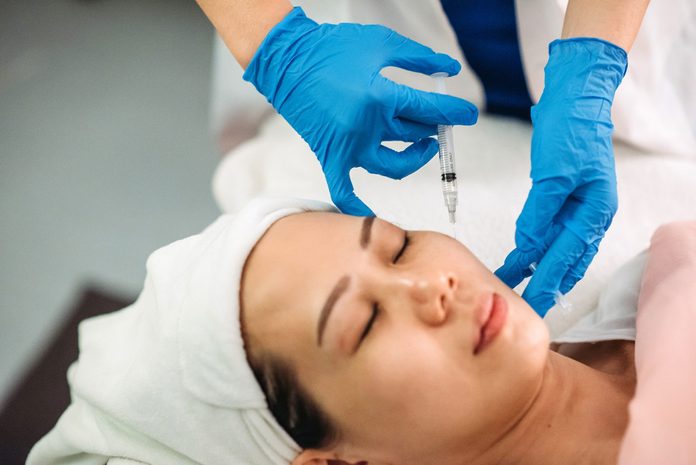What Experts Want You to Know About Collagen Injections

Want to plump up your skin and reverse signs of aging? Here's what dermatologists really think of collagen injections.
You know those wrinkles some people angst over? A lack of collagen is one reason for wrinkles and other signs of aging skin, like sagging and a lack of plumpness. Humans are born with collagen and produce it naturally—up to a certain age, that is. When you hit your 20s, production slows, and eventually the body stops producing collagen on its own.
“Collagen is made by fibroblast cells. These cells are located in the dermis, which is the middle layer of skin between the surface epidermis and the deeper fatty layer of skin.” says Lisa Anthony, MD, a board-certified dermatologist at Westmed Medical Group in Rye, New York. “The body’s ability to make collagen decreases with aging and environmental factors such as UV exposure.” So the older and more sun-kissed your skin becomes, the less collagen your body will make naturally.
Enter: collagen injections, fillers, microneedling, and other skin treatments that aim to supplement or stimulate the body’s natural collagen. The hope is that they will even out the skin’s texture, reduce the appearance of scars, and potentially smooth wrinkles.
(Related: 12 Collagen Supplements and Where to Buy Them in Canada)
What is collagen, exactly?
“Collagen is a protein that is made up of amino acids [and] is found in the skin, tendons, bones and muscles,” says Lucy Chen, MD, a board-certified dermatologist at Riverchase Dermatology in Miami. It performs many vital functions within the body, including helping to hold cells together, strengthening bones, and keeping skin tight.
In relation to the skin, “collagen aids in the stimulation of skin cell turnover, which helps improve the skin’s elasticity and radiance, and it also assists with pigmentation, hydrating, and strengthening the skin,” Chen says. Your body produces collagen by breaking down protein-rich foods, which share the amino acids that your body needs to make collagen. Nutrients, such as vitamin C and copper, also help your body make collagen. The human body creates less collagen as it ages, and the quality of the collagen also declines with age. As a result, skin may begin to wrinkle, sag, or scar more easily.
(Related: What to Know About Liquid Collagen and Its Potential Benefits)
Collagen injection options
To supplement collagen made by the body, scientists have developed collagen injections that can be administered via needles directly into the skin to make it more supple. There are several kinds of dermal fillers, and collagen is one option. “Dermal filler injections are cosmetic procedures used to restore volume and enhance the structure of the skin and fill in deeper, static wrinkles,” Anthony says. “Fillers can be made of collagen, materials that help the body make collagen, or materials that absorb water.”
-
Collagen injections are used to immediately and directly replace loss of volume and structure around the mouth, nose, and cheeks. These are derived from the tissues of cows (often called bovine collagen) or humans (drawn from other places in your body). Bovine collagen requires allergy testing to use. “Bellafill is the only collagen filler approved in the U.S.,” says Anthony. “It is a combination bovine collagen and synthetic filler that is approved for smile lines and acne scars, and results may last up to five years.”
-
Collagen stimulators are absorbed by the body and help it make more collagen on its own over time. These do not require allergy testing unless an individual is allergic to any of the filler materials. They’re often injected around the mouth, smile lines, cheeks, temples, and chin. Currently available products include Sculptra, Radiesse, and Ellansé, and results may last two to three years.
For all types of injections, doctors may use local or topical anesthesia to numb the area of application.
(Related: Does Vegan Collagen Powder Really Work?)
The benefits of collagen injections
These injections can boost the fullness and volume of your lips, cheeks, and acne scars. After injections, you’ll notice more radiant, supple, and less scar-apparent skin. They can also even out areas with stretch marks, which are triggered when skin expands and shrinks at a rapid pace. The marks are a common result of body size changes, such as with pregnancy, strength training, or a growth spurt. The collagen in the skin ruptures and creates striated scarring, and collagen injections can help the skin look smoother over time.
The effects of collagen injections are noticeable right away and might be even more apparent in a week or two. Depending on which type of injection you receive, results last two to five years—longer, if you get touch-ups as needed. These injections are quick, and they’re fairly painless since anesthesia is used during the treatment. Recovery time is short, and side effects beyond swelling are fairly rare.
The risks and downsides of collagen injections
If collagen injects are such a great way to combat aging, why don’t more people get them? The biggest barrier is cost. The financial investment varies based on your geographic location, the training of the professional administering the injections, and what the fillers are made from (using your own fat is a pricier route than a collagen stimulator such as Sculptra, for example). It’s more expensive than the typical cosmetic treatment: Collagen fillers and stimulators generally cost between $600 and $2,000. And that’s not a one-time fee. It’s uncommon for the results of collagen injections to last longer than five years, so reapplication is often required.
Side effects may put some people off the treatment. Chen says that the most common side effects of collagen injections include irritation, redness, bruising, and tenderness. The most frequently noted side effects of collagen stimulators include itching, bleeding, inflammation, tenderness, and pain. Allergic reactions may occur with bovine collagen injections, so a doctor will often perform allergy testing a couple weeks prior to the treatment to ensure you aren’t allergic.
(Related: The Truth on What Collagen Really Does for Your Skin and Hair)
Alternative anti-aging treatments to consider
“Filler procedures produce more immediate results compared to oral collagen supplements,” Anthony says. Oral collagen is available in pill and powder forms, as well as in products like coffee creamers, gummies, and baked goods. It’s either animal-sourced, marine-sourced, or vegan.
The thing is, it’s not a proven anti-aging strategy. There’s not a whole lot of research proving its benefits, and the studies we do have are small and often funded by companies that make collagen. But it probably won’t hurt you if you want to give it a try. A review of several studies published in the Journal of Drugs in Dermatology in 2019 found no negative side effects to popping oral collagen supplements, and doing so at the rate of 2.5 grams daily for just eight weeks may reduce signs of aging.
Other cosmetic treatments like chemical peels may also work for people who want to remove damaged skin, reveal healthy skin, and eliminate fine lines and discoloration, Chen says. “Using skin care products with retinol, hyaluronic acid, or vitamin C can strengthen and tighten the skin, as well as leave it glowing,” she says.
Just be sure to apply sunscreen early and often, no matter what serums and creams you’re using. “Too much sun exposure can destroy the collagen in your skin,” Chen says. “Wearing sunscreen with SPF 30+ and reapplying throughout the day can protect the skin and reduce wrinkles.”
Now that you know about collagen injections, here is what to know if you’re taking biotin supplements.




